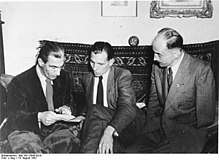Socialist Reich Party
Socialist Reich Party of Germany Sozialistische Reichspartei Deutschlands | |
|---|---|
|
| |
| Leader |
Otto Ernst Remer Fritz Dorls |
| Founded | 2 October 1949 |
| Dissolved |
12 September 1952; banned 23 October 1952 |
| Split from | Deutsche Rechtspartei |
| Merged into | Deutsche Reichspartei[1] |
| Youth wing | Reichsjugend |
| Paramilitary Wing | Reichsfront |
| Membership | c. 10,000 |
| Ideology |
Strasserism Neo-fascism |
| Political position | Third Position |
| International affiliation | N/A |
| Colors | Red, Black |
The Socialist Reich Party of Germany (German: Sozialistische Reichspartei Deutschlands) was a West German Strasserist political party founded in the aftermath of World War II in 1949 as an openly Neo-fascist oriented split-off from the national conservative German Right Party (DKP-DRP). The SRP was the first party to be banned by the Federal Constitutional Court in 1952.
Origins
It was established on 2 October 1949 in Hameln by Otto Ernst Remer, a former Wehrmacht major general who had played a vital role in defeating the 20 July plot, Fritz Dorls, a former editor of the CDU newsletter in Lower Saxony, and Gerhard Krüger, leader of the German Student Union under the Third Reich, after they had been excluded from the DKP-DRP. The SRP saw itself as a legitimate heir of the Nazi Party; most party adherents were former NSDAP members. Its foundation was backed by former Luftwaffe Oberst Hans-Ulrich Rudel.

Party platform
The party claimed Chancellor Konrad Adenauer was a United States puppet and that Grand Admiral Karl Dönitz was the last legitimate President of the German Reich appointed by Adolf Hitler.[2] It denied the existence of the Holocaust, claimed that the United States built the gas ovens of the Dachau concentration camp after the War and that films of concentration camps were faked.[3] The SRP also advocated Europe, led by a reunited German Reich, as a "third force" against both capitalism and communism.[3] It demanded the re-annexation of the former eastern territories of Germany and a "solution of the Jewish question". According to Karl Dietrich Bracher, "SRP propaganda concentrated on a vague 'popular socialism' in which the old National Socialists rediscovered well-worn slogans, and also on a nationalism whose championship of Reich and war was but a thinly disguised continuation of the Lebensraum ideology".[4]
According to Martin A. Lee, the SRP never openly criticised the Soviet Union[5] because the Soviet Union funded the SRP as it held anti-American and pro-Soviet views. The Communist Party of Germany, on the other hand, did not receive Soviet funds because it was viewed as "ineffectual".[6][7] Remer said that if the USSR ever did invade Germany, he would "show the Russians the way to the Rhine" and that SRP members would "post themselves as traffic policemen, spreading their arms so that the Russians can find their way through Germany as quickly as possible".[8][9]
Election results
Dorls had been elected as a DKP-DRP deputy to the Bundestag parliament in the 1949 election. The SRP gained a second seat in parliament, when MP Fritz Rössler (alias Dr. Franz Richter) joined the party in 1950. In May 1951 it won 16 seats in the Lower Saxony state assembly (Landtag) election, receiving 11.0% of the votes with strongholds in the Stade region (21.5%; Verden district: 27.7%). In October 1951 it gained 7.7% of the votes in Bremen and won 8 seats in the city's Bürgerschaft parliament.
Membership
The SRP had about ten thousand members. Affiliated associations were the Reichsfront paramilitary organisation and the Reichsjugend youth wing, which were banned by decision of the Federal Minister of the Interior on 4 May 1951. On the same day, the West German cabinet decided to file an application to the Federal Constitutional Court to find the SRP anti-constitutional and to impose a ban. On 23 October 1952 the court according to Article 21 Paragraph 2 of the Basic Law adjudicated the party unconstitutional and dissolved, prohibited the founding of any successor organisations, withdraw all Bundestag and Landtag mandates and seized the party's assets (BVerfGE 2, 1). In view of the verdict, the SRP leaders had already declared the Party dissolved on 12 September.
See also
Notes
- ↑ Siehe Bericht des bayrischen Verfassungsschutzes, Rechtsextremismus: "Archived copy". Archived from the original on 2008-05-16. Retrieved 2009-09-16.
- ↑ Martin A. Lee, The Beast Reawakens (Warner Books, 1998), p. 50.
- 1 2 Lee, p. 50.
- ↑ Karl Dietrich Bracher, The German Dictatorship. The Origins, Structure, and Consequences of National Socialism (Penguin, 1991), p. 581.
- ↑ Lee, p. 58.
- ↑ Lee, pp. 74-75.
- ↑ "Encyclopedia of modern worldwide extremists and extremist groups", Stephen E. Atkins. Greenwood Publishing Group, 2004. ISBN 0-313-32485-9, ISBN 978-0-313-32485-7. pp. 273-274
- ↑ Lee, p. 65.
- ↑ T. H. Tetens, The New Germany and the Old Nazis (London: Secker & Warburg, 1962), p. 78.
External links
- Germany's New Nazis 1951 pamphlet about the SRP and other neo-nazi groups by the Anglo-Jewish Association